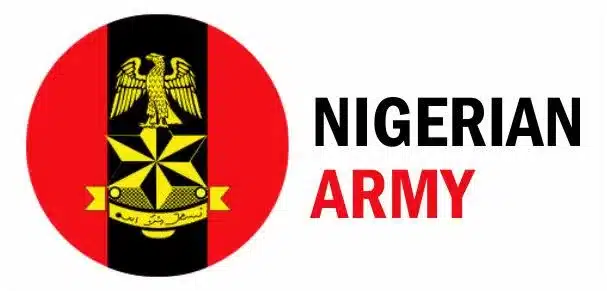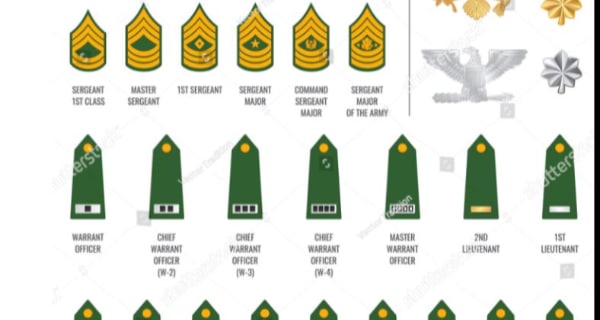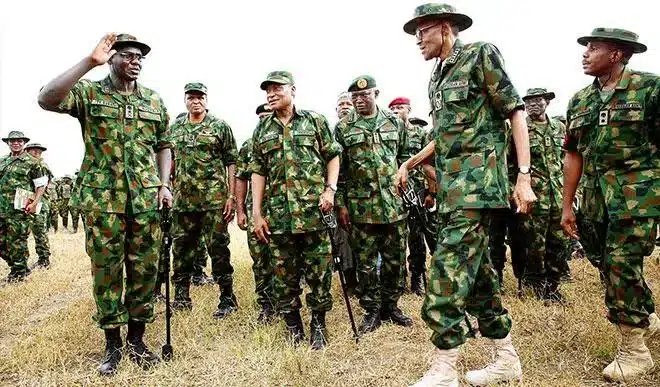The Nigeria army plays a crucial role in maintaining the security and stability of the country. As with any military organization, the Nigeria army has a well-defined rank structure that outlines the hierarchy of its officers and personnel.
Understanding this rank structure is important for understanding the roles, responsibilities, and hierarchy within the military organization.
In this article, we will provide an overview of the Nigeria army rank structure, explaining each rank in detail and discussing the process of advancement and promotion within the Nigeria army.

Whether you are interested in a career in the military or want to gain a better understanding of the Nigeria army, this article will provide valuable insights and information.
The Nigeria Armed Forces
The Nigerian Armed Forces are the military organization responsible for defending Nigeria and its interests. It consists of the Nigerian Army, the Nigerian Navy, and the Nigerian Air Force.
The Nigerian Armed Forces are trained and equipped to carry out a wide range of missions, including peacekeeping operations, counter-insurgency operations, and disaster relief efforts.
They are committed to serving the country and the people and play a vital role in promoting peace and security at home and abroad.
SEE: Who Is the Best Nigerian President from 1960 Till Date?
The Nigerian Army
The Nigeria Army (NA) is the land branch of the Nigerian Armed Forces and the largest among the armed forces. Its major formations include the 1st Division, 2nd Division, 3rd Armored Division, 81st Division, 82nd Division, and the newly formed 8th, 7th, and 6th Divisions.
The Nigerian army is headed currently by Major General Farouk Yahaya, who President Muhammadu Buhari appointed. The Nigerian Army has been playing a major role in the defense of Nigerian Democracy since the first republic to date.

Nigeria Army Ranks
The Nigerian army has a hierarchical rank structure that defines its officers’ and personnel’ relative positions and responsibilities.
Officers with a commission and non-commissioned officers make up the Nigerian Army’s two different rank groups. Beginning with the highest rank and working down, here is the commissioned officer ranks in the Nigerian Army:
- Field Marshal (5-Star General): The highest rank in the Nigerian Army is Field Marshal. It has a 5-Star rank, which no one in Nigerian history has ever reached.
- General: This is the highest rank in the Nigerian army and is held by the most senior commissioned officer. The General is responsible for leading the entire military organization and carrying out complex tasks at the highest level.
- Lieutenant General: This rank is held by senior commissioned officers and is responsible for leading a large unit of soldiers and carrying out complex tasks at the highest level.
- Major General: This rank is held by senior commissioned officers and is responsible for leading a large unit of soldiers and carrying out complex tasks at the highest level.
- Brigadier General: This rank is held by senior commissioned officers and is responsible for leading a division-sized unit of soldiers and carrying out complex tasks.
- Colonel: This rank is held by senior commissioned officers and is responsible for leading a large unit of soldiers and carrying out complex tasks.
- Lieutenant Colonel: This rank is held by senior commissioned officers and is responsible for leading a brigade-sized unit of soldiers and carrying out more complex tasks.
- Major: This rank is held by senior commissioned officers and is responsible for leading a battalion-sized unit of soldiers and carrying out more complex tasks.
- Captain: This rank is held by senior commissioned officers and is responsible for leading a company-sized unit of soldiers and carrying out more complex tasks.
- Lieutenant: This rank is held by mid-level commissioned officers and is responsible for leading a larger team of soldiers and carrying out more complex tasks.
- Second Lieutenant: This is the lowest rank for commissioned officers and is responsible for leading a small team of soldiers.
READ: Olusegun Obasanjo Biography: Military/Political Career, Net worth, Polygamy
Non-Commissioned Officer
- Master Warrant Officer: This is a senior rank for non-commissioned officers and is responsible for providing technical and operational support to officers at the highest level.
- Warrant Officer Class 1: This is the highest rank for non-commissioned officers and is responsible for providing expert technical and operational support to officers.
- Warrant Officer Class 2: This rank is held by senior non-commissioned officers and is responsible for providing technical and operational support to officers.
- Staff Sergeant: This highly experienced enlisted rank is responsible for supervising a larger team of soldiers and carrying out more complex tasks.
- Sergeant: This senior enlisted rank is responsible for supervising a larger team of soldiers. Sergeants also play a key role in training and mentoring junior personnel.
- Corporal: This rank is held by mid-level enlisted personnel. Corporals are responsible for leading a small team of soldiers and ensuring that they carry out their duties effectively.
- Lance Corporal: This rank is held by junior enlisted personnel. Lance Corporals assist their superiors in leading a small team of soldiers and may be responsible for supervising Privates.
- Private: This is the lowest rank in the Nigerian army and is held by enlisted personnel. Privates are responsible for carrying out basic tasks and following orders from their superiors.
SEE: President Muhammadu Buhari Biography: Achievements, Net worth, Salary, and More
Significance of the Nigeria Rank Structure
The rank structure in the Nigerian army serves several important purposes, including:
Hierarchy and Chain of Command: The rank structure provides a clear hierarchy and chain of command within the army. This enables officers and personnel to know to whom they are accountable and to whom they can rely on guidance and support.
Responsibility and Authority: The rank structure defines the responsibilities and authority of each officer and personnel. It outlines the tasks and duties that each individual is expected to perform and provides the framework for the delegation of authority.
Career Advancement: The rank structure provides a clear path for career advancement within the Nigerian army. It outlines the steps that individuals must take to move up the ranks and the criteria they must meet to be eligible for the promotion.
Recognition and Status: The rank structure also serves as a means of recognizing and rewarding the achievements and contributions of officers and personnel. It provides a clear and objective way of assessing an individual’s performance and determining their status within the military organization.
Maintaining Discipline and Order: The rank structure helps to maintain discipline and order within the Nigerian army. It provides a clear structure for enforcing rules and regulations and ensuring that officers and personnresponsibly and professionally.

Nigerian Army Salary Structure
The Nigerian army’s salary structure depends on rank. A Nigerian soldier is paid according to his rank and years of service. Below is the current salary structure of the Nigerian Army.
The Nigerian Army salaries of commissioned officers ranging from the highest to the lowest are as follows:
General – 1,500,000 Naira per month.
Lieutenant General – Take home the sum of 1,000,000 Naira monthly.
Major General – Major General receives the third highest with a sum of 950,000 Naira every month.
Brigadier General – Receives N750,000 per month.
Colonel – Colonel takes home N550,000 every month.
Lieutenant Colonel – Receives N350,000 monthly
Major – 300,000 Naira monthly
Captain – 220,000 Naira per month
Lieutenant – Lieutenant’s monthly salary is 180,000 Naira
Second Lieutenant – Second Lieutenant takes home a monthly salary of N120,000
Note that free houses are provided for them plus other bonuses. Also, they don’t pay for electricity supply.
The Nigerian Army salaries of non-commissioned officers starting from the highest to the lowest are as follows:
Master Warrant Officer – N90,000 every month.
Warrant Officer – N80,000 monthly.
Staff Sergeant – Staff Sergeant’s monthly take home is 68,000 Naira.
Sergeant – 63,000 Naira per month.
Corporal – Corporal receives 58,000 Naira monthly.
Lance Corporal – Lance Corporal earns about 54,000 – 55,000 Naira per month.
Private Soldier – Private Soldier earns between 48,000 – 49,000 Naira monthly
SEE: Nigerian National Anthem: All You Need to Know
The Nigerian Navy (NN) is the sea branch of the Nigerian Armed Forces. The Nigerian Navy command structure today, consists of the Naval Headquarters in Abuja as well as three other operational commands with headquarters in Lagos, Calabar, and Bayelsa.
The training command headquarters are located in Lagos, Nigeria’s commercial capital, but with training facilities spread all over Nigeria.
There are five operational bases; five forward operational bases (with two more soon to come on stream), two dockyards located in Lagos and Port Harcourt, and two fleets based in Lagos and Calabar. The Nigerian Navy is currently headed by Vice Admiral Awwal Zubairu Gambo.
The Nigeria Air Force
The Nigerian Air Force was formally established in January 1964, with technical assistance from West Germany. The Air Force started as a transport unit, with the aircrew being trained in Canada, Ethiopia, and Pakistan.
The Air Force did not get combat capability until several MiG-17 aircraft were presented by the Soviet Union in 1966.
In 2007, the Air Force had a strength of 10,000. It flies transport, trainer, helicopter, and fighter aircraft. By 2021, the number of Air Force personnel had increased to 18,000.
The Air Force sponsors the Air Force Military School, in Jos, Nigeria, and the Air Force Institute of Technology. Nigeria also has pursued a policy of developing domestic training and military production capabilities.
Nigeria has continued a strict policy of diversification in its military procurement from various countries. The Nigerian Air force is currently headed by Air Marshal Isiaka Oladayo Amao.
Benefits of being in the Nigeria Army
Being an officer in the Nigerian army comes with several benefits and privileges. Some of the key benefits and privileges include:
Career Opportunities: The Nigerian army offers a wide range of career opportunities for officers, from serving in peacekeeping missions to commanding troops in the field. This allows officers to gain diverse experiences and develop a range of skills and competencies.
Competitive Compensation: Officers in the Nigerian army are well-compensated for their service, with salaries and benefits that are competitive with those offered by other government organizations.
Professional Development: The Nigerian army places a strong emphasis on professional development and provides its officers with opportunities to pursue advanced education and training. This helps officers to keep their skills up-to-date and maintain their competitive edge in the workforce.
Prestige: Being an officer in the Nigerian army is a matter of great prestige, and officers are respected and admired in their communities. This prestige can translate into personal and professional opportunities that are not available to civilians.
Sense of Purpose: Serving in the Nigerian army provides officers with a sense of purpose and meaning, as they work to protect the country and its citizens. This sense of purpose is a powerful motivator that can sustain officers through difficult times and help them to achieve their goals.
These benefits and privileges are just a few of the many that come with being an officer in the Nigerian army.
Conclusion
In conclusion, understanding the Nigerian army ranks is important for several reasons. Some of these include:
Providing Context: The Nigerian army ranks structure provides context for the organization’s mission, structure, and values.
By understanding the ranks and the responsibilities that come with each one, readers can gain a deeper appreciation for the role of the army in the country.
Improving Communication: Understanding the rank structure can help improve communication between officers and soldiers, as it provides a common language and framework for discussion.
Understanding Career Paths: The rank structure provides a roadmap for officers and soldiers, indicating the steps they need to take to advance their careers and reach higher ranks.
Recognizing Accomplishments: The rank structure provides a way to recognize and reward the accomplishments of officers and soldiers.
By understanding the ranks, readers can appreciate the achievements of those who have served and those who are serving in the Nigerian army.
Enhancing Respect: Understanding the rank structure can enhance respect for the Nigerian army, as it demonstrates the organization’s commitment to professionalism, education, and leadership.
In short, understanding the Nigerian army ranks provides a deeper understanding of the organization and the role it plays in the country. By providing this context and recognition, the rank structure helps to sustain the Nigerian army and ensure its continued success.





